- Home
- Neal Stephenson
Some Remarks: Essays and Other Writing Page 31
Some Remarks: Essays and Other Writing Read online
Page 31
“Oh, that’s typical. I suppose you think we’re a bunch of socially inept, acne-ridden, high-IQ teenage hackers who play sophomoric pranks on the Establishment.”
“The thought had crossed my mind,” I say. But the fact that the cartoon sloth can give me such a realistic withering look, as he is doing now, suggests a much higher level of technical sophistication. Raster only has six facial expressions and none of them is very good.
“Your brother runs an ad agency, no?”
“Correct.”
“He recently signed up Simoleons Corp.?”
“Correct.”
“As soon as he did, the government put your house under full-time surveillance.”
Suddenly the glass eyeball in the front of the set-top box is looking very big and beady to me. “They tapped our infotainment cable?”
“Didn’t have to. The cable people are happy to do all the dirty work—after all, they’re beholden to the government for their monopoly. So all those calculations you did using Raster were piped straight to the cable company and from there to the government. We’ve got a mole in the government who cc’d us everything through an anonymous remailer in Jyvaskyla, Finland.”
“Why should the government care?”
“They care big-time,” Codex says. “They’re going to destroy Simoleons. And they’re going to step all over your family in the process.”
“Why?”
“Because if they don’t destroy E-money,” Codex says, “E-money will destroy them.”
The next afternoon I show up at my brother’s office, in a groovily refurbished ex-power plant on the near West Side. He finishes rolling some calls and then waves me into his office, a cavernous space with a giant steam turbine as a conversation piece. I think it’s supposed to be an irony thing.
“Aren’t you supposed to be cruising the I-way for stalled motorists?” he says.
“Spare me the fraternal heckling,” I say. “We crypto-anarchists don’t have time for such things.”
“Crypto-anarchists?”
“The word panarchist is also frequently used.”
“Cute,” he says, rolling the word around in his head. He’s already working up a mental ad campaign for it.
“You’re looking flushed and satisfied this afternoon,” I say. “Must have been those two imperial pints of Hog City Porter you had with your baby-back ribs at Divane’s Lakeview Grill.”
Suddenly he sits up straight and gets an edgy look about him, as if a practical joke is in progress, and he’s determined not to play the fool.
“So how’d you know what I had for lunch?”
“Same way I know you’ve been cheating on your taxes.”
“What!?”
“Last year you put a new tax-deductible sofa in your home office. But that sofa is a hide-a-bed model, which is a no-no.”
“Hackers,” he says. “Your buddies hacked into my records, didn’t they?”
“You win the Stratolounger.”
“I thought they had safeguards on these things now.”
“The files are harder to break into. But every time information gets sent across the wires—like, when Anne uses Raster to do the taxes—it can be captured and decrypted. Because, my brother, you bought the default data-security agreement with your box, and the default agreement sucks.”
“So what are you getting at?”
“For that,” I say, “we’ll have to go someplace that isn’t under surveillance.”
“Surveillance!? What the . . .” he begins. But then I nod at the TV in the corner of his office, with its beady glass eye staring out at us from the set-top box.
We end up walking along the lakeshore, which, in Chicago in January, is madness. But we hail from North Dakota, and we have all the cold-weather gear it takes to do this. I tell him about Raster and the cable company.
“Oh, Jesus!” he says. “You mean those numbers aren’t secret?”
“Not even close. They’ve been put in the hands of 27 stooges hired by the government. The stooges have already FedEx’d their entry forms with the correct numbers. So, as of now, all of your Simoleons—$27 million worth—are going straight into the hands of the stooges on Super Bowl Sunday. And they will turn out to be your worst public-relations nightmare. They will cash in their Simoleons for comic books and baseball cards and claim it’s safer. They will intentionally go bankrupt and blame it on you. They will show up in twos and threes on tawdry talk shows to report mysterious disappearances of their Simoleons during Metaverse transactions. They will, in short, destroy the image—and the business—of your client. The result: victory for the government, which hates and fears private currencies. And bankruptcy for you, and for Mom and Dad.”
“How do you figure?”
“Your agency is responsible for screwing up this sweepstakes. Soon as the debacle hits, your stock plummets. Mom and Dad lose millions in paper profits they’ve never had a chance to enjoy. Then your big shareholders will sue your ass, my brother, and you will lose. You gambled the value of the company on the faulty data-security built into your set-top box, and you as a corporate officer are personally responsible for the losses.”
At this point, big brother Joe feels the need to slam himself down on a park bench, which must feel roughly like sitting on a block of dry ice. But he doesn’t care. He’s beyond physical pain. I sort of expected to feel triumphant at this point, but I don’t.
So I let him off the hook. “I just came from your accounting firm,” I say. “I told them I had discovered an error in my calculations—that my set-top box had a faulty chip. I supplied them with 27 new numbers, which I worked out by hand, with pencil and paper, in a conference room in their offices, far from the prying eye of the cable company. I personally sealed them in an envelope and placed them in their vault.”
“So the sweepstakes will come off as planned,” he exhales. “Thank God!”
“Yeah—and while you’re at it, thank me and the panarchists,” I shoot back. “I also called Mom and Dad, and told them that they should sell their stock—just in case the government finds some new way to sabotage your contest.”
“That’s probably wise,” he says sourly, “but they’re going to get hammered on taxes. They’ll lose 40% of their net worth to the government, just like that.”
“No, they won’t,” I say. “They aren’t paying any taxes.”
“Say what?” He lifts his chin off his mittens for the first time in a while, reinvigorated by the chance to tell me how wrong I am. “Their cash basis is only $10,000—you think the IRS won’t notice $20 million in capital gains?”
“We didn’t invite the IRS,” I tell him. “It’s none of the IRS’s damn business.”
“They have ways to make it their business.”
“Not any more. Mom and Dad aren’t selling their stock for dollars, Joe.”
“Simoleons? It’s the same deal with Simoleons—everything gets reported to the government.”
“Forget Simoleons. Think CryptoCredits.”
“CryptoCredits? What the hell is a CryptoCredit?” He stands up and starts pacing back and forth. Now he’s convinced I’ve traded the family cow for a handful of magic beans.
“It’s what Simoleons ought to be: E-money that is totally private from the eyes of government.”
“How do you know? Isn’t any code crackable?”
“Any kind of E-money consists of numbers moving around on wires,” I say. “If you know how to keep your numbers secret, your currency is safe. If you don’t, it’s not. Keeping numbers secret is a problem of cryptography—a branch of mathematics. Well, Joe, the crypto-anarchists showed me their math. And it’s good math. It’s better than the math the government uses. Better than Simoleons’ math too. No one can mess with CryptoCredits.”
He heaves a big sigh. “O.K., O.K.—you want me to say it? I’ll say it. You were right. I was wrong. You studied the right thing in college after all.”
“I’m not worthless scum?”
&
nbsp; “Not worthless scum. So. What do these crypto-anarchists want, anyway?”
For some reason I can’t lie to my parents, but Joe’s easy. “Nothing,” I say. “They just wanted to do us a favor, as a way of gaining some goodwill with us.”
“And furthering the righteous cause of World Panarchy?”
“Something like that.”
Which brings us to Super Bowl Sunday. We are sitting in a skybox high up in the Superdome, complete with wet bar, kitchen, waiters and big TV screens to watch the instant replays of what we’ve just seen with our own naked, pitiful, nondigital eyes.
The corporate officers of Simoleons are there. I start sounding them out on their cryptographic protocols, and it becomes clear that these people can’t calculate their gas mileage without consulting Raster, much less navigate the subtle and dangerous currents of cutting-edge cryptography.
A Superdome security man comes in, looking uneasy. “Some, uh, gentlemen are here,” he says. “They have tickets that appear to be authentic.”
It’s three guys. The first one is a 300 pounder with hair down to his waist and a beard down to his navel. He must be a Bears fan because he has painted his face and bare torso blue and orange. The second one isn’t quite as introverted as the first, and the third isn’t quite the button-down conformist the other two are. Mr. Big is carrying an old milk crate. What’s inside must be heavy, because it looks like it’s about to pull his arms out of their sockets.
“Mr. and Mrs. De Groot?” he says, as he staggers into the room. Heads turn towards my mom and dad, who, alarmed by the appearance of these three, have declined to identify themselves. The guy makes for them and slams the crate down in front of my dad. “I’m the guy you’ve known as Codex,” he says. “Thanks for naming us as your broker.”
If Joe wasn’t a rowing-machine abuser, he’d be blowing aneurysms in both hemispheres about now. “Your broker is a half-naked blue-and-orange crypto-anarchist?”
Dad devotes 30 seconds or so to lighting his pipe. Down on the field, the two-minute warning sounds. Dad puffs out a cloud of smoke and says, “He seemed like an honest sloth.”
“Just in case,” Mom says, “we sold half the stock through our broker in Bismarck. He says we’ll have to pay taxes on that.”
“We transferred the other half offshore, to Mr. Codex here,” Dad says, “and he converted it into the local currency—tax free.”
“Offshore? Where? The Bahamas?” Joe asks.
“The First Distributed Republic,” says the big panarchist. “It’s a virtual nation-state. I’m the Minister of Data Security. Our official currency is CryptoCredits.”
“What the hell good is that?” Joe says.
“That was my concern too,” Dad says, “so, just as an experiment, I used my CryptoCredits to buy something a little more tangible.”
Dad reaches into the milk crate and heaves out a rectangular object made of yellow metal. Mom hauls out another one. She and Dad begin lining them up on the counter, like King and Queen Midas unloading a carton of Twinkies.
It takes Joe a few seconds to realize what’s happening. He picks up one of the gold bars and gapes at it. The Simoleons execs crowd around and inspect the booty.
“Now you see why the government wants to stamp us out,” the big guy says. “We can do what they do—cheaper and better.”
For the first time, light dawns on the face of the Simoleons CEO. “Wait a sec,” he says, and puts his hands to his temples. “You can rig it so that people who use E-money don’t have to pay taxes to any government? Ever?”
“You got it,” the big panarchist says. The horn sounds announcing the end of the first half.
“I have to go down and give away some Simoleons,” the CEO says, “but after that, you and I need to have a talk.”
The CEO goes down in the elevator with my brother, carrying a box of 27 smart cards, each of which is loaded up with secret numbers that makes it worth a million Simoleons. I go over and look out the skybox window: 27 Americans are congregated down on the 50-yard line, waiting for their mathematical manna to descend from heaven. They are just the demographic cross section that my brother was hoping for. You’d never guess they were all secretly citizens of the First Distributed Republic.
The crypto-anarchists grab some Jolt from the wet bar and troop out, so now it’s just me, Mom and Dad in the skybox. Dad points at the field with the stem of his pipe. “Those 27 folks down there,” he says. “They didn’t get any help from you, did they?”
I’ve lied about this successfully to Joe. But I know it won’t work with Mom and Dad. “Let’s put it this way,” I say, “not all panarchists are long-haired, Jolt-slurping maniacs. Some of them look like you—exactly like you, as a matter of fact.”
Dad nods; I’ve got him on that one.
“Codex and his people saved the contest, and our family, from disaster. But there was a quid pro quo.”
“Usually is,” Dad says.
“But it’s good for everyone. What Joe wants—and what his client wants—is for the promotion to go well, so that a year from now, everyone who’s watching this broadcast today will have a high opinion of the safety and stability of Simoleons. Right?”
“Right.”
“If you give the Simoleons away at random, you’re rolling the dice. But if you give them to people who are secretly panarchists—who have a vested interest in showing that E-money works—it’s a much safer bet.”
“Does the First Distributed Republic have a flag?” Mom asks, out of left field. I tell her these guys don’t look like sewing enthusiasts. So, even before the second half starts, she’s sketched out a flag on the back of her program. “It’ll be very colorful,” she says. “Like a jar of jelly beans.”
Locked In (2011)
The phenomena of path dependence and lock-in can be illustrated with many examples, but one of the most vivid is the gear we use to launch things into space. Rockets are a very old invention. The Chinese have had them for something like a thousand years. Francis Scott Key wrote about them during the War of 1812 and we sing about them at every football game. As late as the 1930s, however, they remained small, experimental, and failure-prone.
There is no way, of course, to guess how rockets might have developed, or failed to, were it not for the fact that, during the 1940s, the world’s most technically sophisticated nation came under the absolute control of a crazy dictator who decreed that vast physical and intellectual resources should be hurled into the project of creating rockets of hitherto unimagined size.
These rockets, which were known as V-2s, were worse than useless from a military standpoint, in the sense that the same resources would have produced a much greater effect had they been devoted instead to the production of U-boats or Messerschmitts. Accordingly, the victorious nations showed only modest interest in their development following the war. It is reasonable to suppose that little more would have been done with them, had it not been for another event, happening at the same time, even more bizarre and incredible than the seizure of absolute control over a modern nation-state by a genocidal madman. I refer, of course, to the sudden and completely unexpected development of nuclear weapons, undertaken over the course of a very few years by a top-secret crash program atop a mesa in New Mexico.
Atomic bombs turned out to be expensive, dirty, controversial, and of limited military use (it was difficult to find targets sufficiently large to be worth using them on). So they might have fizzled out, were it not for the fact that there just happened to be another victorious nation, controlled by a dictator, every bit as evil as the V-2 maker, but not so crazy, who insisted that his nation, the USSR, had to have atomic bombs too. Moreover, the conditions existing in the USSR then were such as to enable the development of that bomb in near-perfect secrecy. The United States could only guess at what the Soviets were doing; and given the stakes, they naturally tended to make the scariest guesses possible. The military logic of nuclear warfare forced them to develop the hydrogen bomb.
/>
Rockets and H-bombs are made for each other. The rockets of the 1950s and 1960s were so expensive, and yet so inaccurate, that their only effective military use was lobbing bombs of inconceivably vast destructive power in the general direction of large urban areas.
Conversely, because those bombs were so destructive (making it tricky to drop them out of a manned aircraft without killing the crew) and the consequences of a first strike so dire, ICBMs—which could be launched from hardened, dispersed silos, as contrasted with bombers, which must take off from concentrated, vulnerable air bases—were the best way to deliver them.
Vast, nation-bankrupting expenditures were now directed to the development of such rockets. In Dark Sun, Richard Rhodes estimates the cost of the nuclear weapons and missile programs at $4 trillion in the United States and the USSR each.
Since the countries were on opposite sides of the planet, the rockets had to be large enough to throw their payload halfway around the world: only a small step short of putting payloads into orbit.
The unthinkable destructiveness of nuclear warfare now led the two superpowers to compete by proxy in other arenas, notably the exploration of space. Astronauts became heroic figures. Killing them accidentally became a no-no. A “failure is not an option, price is no object” mentality became prevalent.
To recap, the existence of rockets big enough to hurl significant payloads into orbit was contingent on the following radically improbable series of events:
1. World’s most technically advanced nation under absolute control of superweapon-obsessed madman
2. Astonishing advent of atomic bombs at exactly the same time
3. A second great power dominated by secretive, superweapon-obsessed dictator
4. Nuclear/strategic calculus militating in favor of ICBMs as delivery system
5. Geographic situation of adversaries necessitating that ICBMs must have near-orbital capability

 Zodiac: The Eco-Thriller
Zodiac: The Eco-Thriller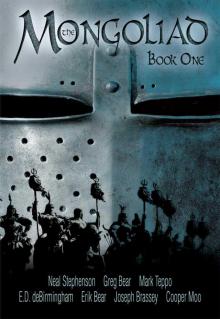 The Mongoliad: Book One
The Mongoliad: Book One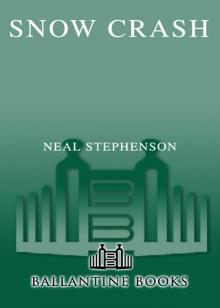 Snow Crash
Snow Crash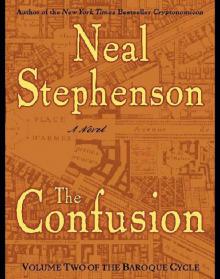 The Confusion: Volume Two of the Baroque Cycle
The Confusion: Volume Two of the Baroque Cycle The Rise and Fall of D.O.D.O.
The Rise and Fall of D.O.D.O.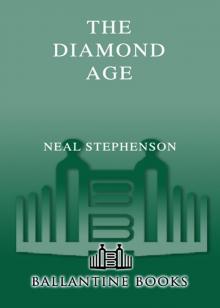 The Diamond Age: Or, a Young Lady's Illustrated Primer
The Diamond Age: Or, a Young Lady's Illustrated Primer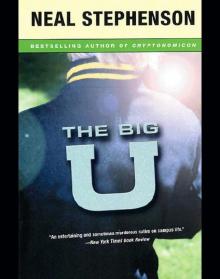 The Big U
The Big U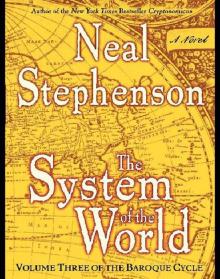 The System of the World: Volume Three of the Baroque Cycle
The System of the World: Volume Three of the Baroque Cycle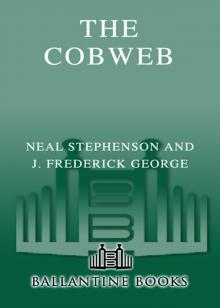 The Cobweb
The Cobweb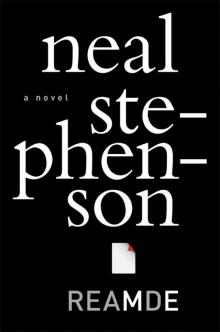 Reamde
Reamde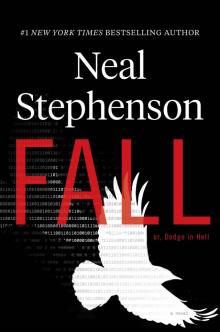 Fall; or, Dodge in Hell
Fall; or, Dodge in Hell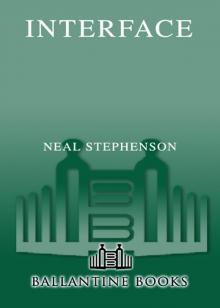 Interface
Interface Quicksilver
Quicksilver The Mongoliad: Book Three
The Mongoliad: Book Three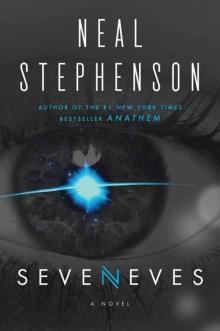 Seveneves
Seveneves Atmosphæra Incognita
Atmosphæra Incognita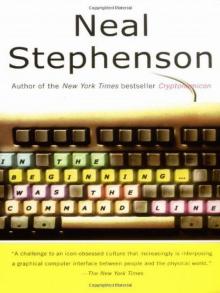 In the Beginning...Was the Command Line
In the Beginning...Was the Command Line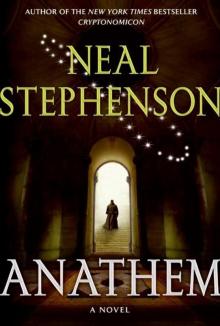 Anathem
Anathem The Rise and Fall of D.O.D.O.: A Novel
The Rise and Fall of D.O.D.O.: A Novel The Mongoliad: Book Two
The Mongoliad: Book Two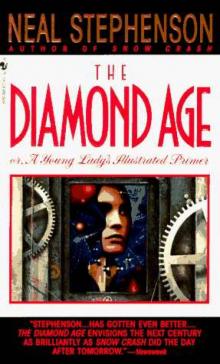 Diamond Age or a Young Lady's Illustrated Primer
Diamond Age or a Young Lady's Illustrated Primer THE System OF THE WORLD
THE System OF THE WORLD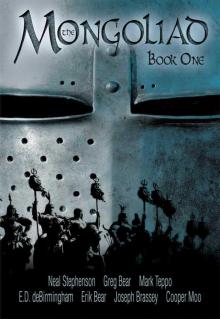 The Mongoliad: Book One tfs-1
The Mongoliad: Book One tfs-1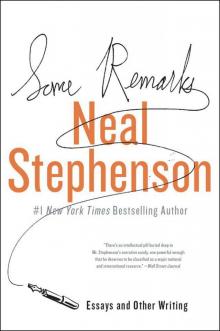 Some Remarks: Essays and Other Writing
Some Remarks: Essays and Other Writing Zodiac
Zodiac Spew
Spew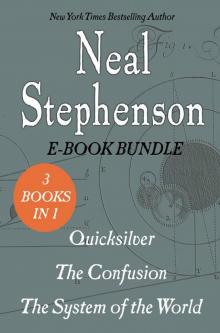 The Baroque Cycle: Quicksilver, the Confusion, and the System of the World
The Baroque Cycle: Quicksilver, the Confusion, and the System of the World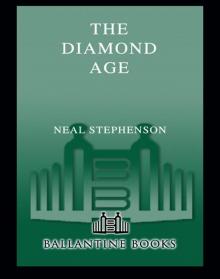 The Diamond Age
The Diamond Age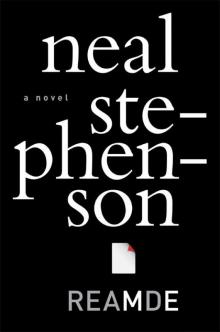 Reamde: A Novel
Reamde: A Novel In the Kingdom of Mao Bell
In the Kingdom of Mao Bell Mother Earth Mother Board
Mother Earth Mother Board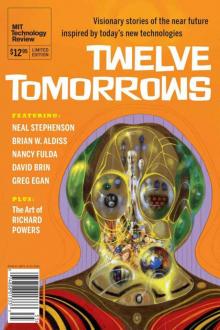 Twelve Tomorrows - Visionary stories of the near future inspired by today's technologies
Twelve Tomorrows - Visionary stories of the near future inspired by today's technologies The Confusion
The Confusion The Great Simoleon Caper
The Great Simoleon Caper The Mongoliad: Book Three tfs-3
The Mongoliad: Book Three tfs-3